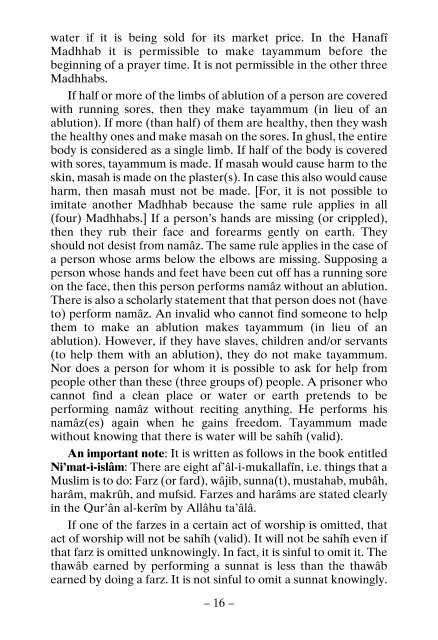O Son !
THE BOOK ‘O SON’ Al-hamdu lillâhi Rabbil ’âlamîn. Wa-s-salâtu wa-s-salâmu ’alâ Rasûlinâ Muhammadin wa Âlihi wa Sahbihi ajma’în. 1– O son! Collecting from books written by the scholars of the Hanafî Madhhab three hundred and sixty hadîth-i-sherîfs and forty-four khabars and also the seven essentials and the five rukns and the seven wâjibs and the fourteen sunnats and the twenty-five mustahabs and the fourteen mufsids of namâz, I have explained them for you. Adapt your acts and deeds to these teachings so that you attain fayz and nejât (salvation)! 2– Also for your information, I have collected a thousand and ninety âdâb (adabs) for you and for other young Muslims like you. If you adapt your actions and acts of worship to these teachings, they will be sufficient for you. If you laze, disobey Allâhu ta’âlâ and cease from these practices and manners, you will be afflicted with slavery and disgrace in the world and subjected to torment in the world to come. If you live up to them and advise your Muslim brothers to do the same, it will be useful for you. They will say blessings over you. And Haqq ta’âlâ will accept their invocations. For, a slave will be pardoned on account of another slave’s invocations for them.
THE BOOK ‘O SON’
Al-hamdu lillâhi Rabbil ’âlamîn. Wa-s-salâtu wa-s-salâmu ’alâ
Rasûlinâ Muhammadin wa Âlihi wa Sahbihi ajma’în.
1– O son! Collecting from books written by the scholars of the
Hanafî Madhhab three hundred and sixty hadîth-i-sherîfs and
forty-four khabars and also the seven essentials and the five rukns
and the seven wâjibs and the fourteen sunnats and the twenty-five
mustahabs and the fourteen mufsids of namâz, I have explained
them for you. Adapt your acts and deeds to these teachings so that
you attain fayz and nejât (salvation)!
2– Also for your information, I have collected a thousand and
ninety âdâb (adabs) for you and for other young Muslims like you.
If you adapt your actions and acts of worship to these teachings,
they will be sufficient for you. If you laze, disobey Allâhu ta’âlâ
and cease from these practices and manners, you will be afflicted
with slavery and disgrace in the world and subjected to torment in
the world to come.
If you live up to them and advise your Muslim brothers to do
the same, it will be useful for you. They will say blessings over you.
And Haqq ta’âlâ will accept their invocations. For, a slave will be
pardoned on account of another slave’s invocations for them.
You also want an ePaper? Increase the reach of your titles
YUMPU automatically turns print PDFs into web optimized ePapers that Google loves.
water if it is being sold for its market price. In the Hanafî<br />
Madhhab it is permissible to make tayammum before the<br />
beginning of a prayer time. It is not permissible in the other three<br />
Madhhabs.<br />
If half or more of the limbs of ablution of a person are covered<br />
with running sores, then they make tayammum (in lieu of an<br />
ablution). If more (than half) of them are healthy, then they wash<br />
the healthy ones and make masah on the sores. In ghusl, the entire<br />
body is considered as a single limb. If half of the body is covered<br />
with sores, tayammum is made. If masah would cause harm to the<br />
skin, masah is made on the plaster(s). In case this also would cause<br />
harm, then masah must not be made. [For, it is not possible to<br />
imitate another Madhhab because the same rule applies in all<br />
(four) Madhhabs.] If a person’s hands are missing (or crippled),<br />
then they rub their face and forearms gently on earth. They<br />
should not desist from namâz. The same rule applies in the case of<br />
a person whose arms below the elbows are missing. Supposing a<br />
person whose hands and feet have been cut off has a running sore<br />
on the face, then this person performs namâz without an ablution.<br />
There is also a scholarly statement that that person does not (have<br />
to) perform namâz. An invalid who cannot find someone to help<br />
them to make an ablution makes tayammum (in lieu of an<br />
ablution). However, if they have slaves, children and/or servants<br />
(to help them with an ablution), they do not make tayammum.<br />
Nor does a person for whom it is possible to ask for help from<br />
people other than these (three groups of) people. A prisoner who<br />
cannot find a clean place or water or earth pretends to be<br />
performing namâz without reciting anything. He performs his<br />
namâz(es) again when he gains freedom. Tayammum made<br />
without knowing that there is water will be sahîh (valid).<br />
An important note: It is written as follows in the book entitled<br />
Ni’mat-i-islâm: There are eight af’âl-i-mukallafîn, i.e. things that a<br />
Muslim is to do: Farz (or fard), wâjib, sunna(t), mustahab, mubâh,<br />
harâm, makrûh, and mufsid. Farzes and harâms are stated clearly<br />
in the Qur’ân al-kerîm by Allâhu ta’âlâ.<br />
If one of the farzes in a certain act of worship is omitted, that<br />
act of worship will not be sahîh (valid). It will not be sahîh even if<br />
that farz is omitted unknowingly. In fact, it is sinful to omit it. The<br />
thawâb earned by performing a sunnat is less than the thawâb<br />
earned by doing a farz. It is not sinful to omit a sunnat knowingly.<br />
– 16 –

















